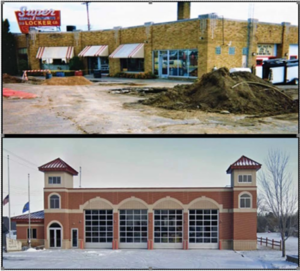The Wisconsin Department of Natural Resources (DNR) has posted requests for proposals on three brownfield planning projects. The projects are funded by a fiscal year 2025 Small Technical Assistance Grant from the U.S. Environmental Protection Agency (EPA).
Peshtigo Brownfield Site Reuse Concept Planning
The DNR is seeking proposals from qualified firms interested in providing consulting services to assist with brownfield redevelopment planning to identify redevelopment opportunities for a 0.54-acre property in downtown Peshtigo, Wisconsin, formerly known as The Landmark. The property has been vacant for 15 years and poses safety concerns for the city.
Turtle Lake Brownfield Site Reuse Concept Planning
The DNR is seeking proposals from qualified firms interested in providing consulting services to assist with brownfield redevelopment planning at the 1.037-acre site of the former Turtle Lake Creamery in the village of Turtle Lake, Wisconsin. Following 50 years of use as a creamery, the property was used to store telecommunications equipment. Residual contamination is present at the site after some cleanup in 2015. The village took ownership of the property in 2022.
Wisconsin Rapids Brownfield Site Reuse Planning
The DNR is seeking proposals from qualified firms interested in providing consulting services to assist with brownfield redevelopment planning at the 1.69-acre former site of the Northern Steel Castings foundry in the city of Wisconsin Rapids, Wisconsin. The city is interested in acquiring the property from Wood County, which took ownership of the property in 2023. This project will help advance the redevelopment of the site for the benefit of the city and the county.
Proposals are due Nov. 22, 2024. The RFPs are available on the RR Program Public Notices webpage.


